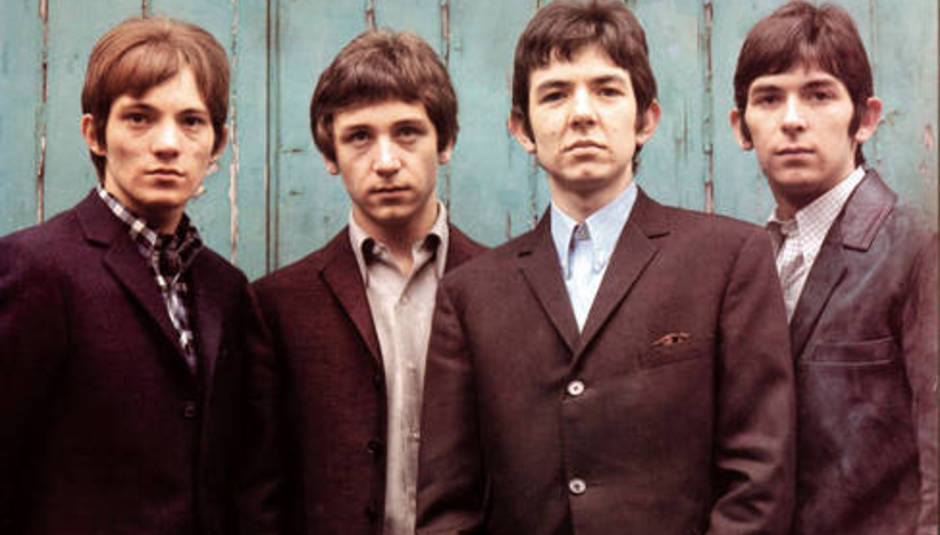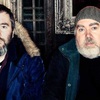Kenney Jones is a name that shouldn't need any introduction. As a founder member of The Small Faces back in 1965, he helped pioneer the soul-infused sound that spawned the Mod movement and a host of groundbreaking records to boot. Born in Stepney sixty three years ago, Jones achievements with The Small Faces paralleled the likes of The Beatles, The Rolling Stones and The Kinks in an era where British music really did rule the waves.
From their early singles like 'Whatcha Gonna Do About It' and 'Sha-La-La-La-Lee' to top three smashes 'All Or Nothing' - their only number one - 'Itchycoo Park' and 'Lazy Sunday' not to mention the landmark album 'Ogdens Nut Gone Flake' - arguably the first ever record made as a "concept", The Small Faces place in history as one of the most influential bands ever is assured. Having split in 1969 after singer Steve Marriott quit to form Humble Pie, Jones and the remaining band members Ian McLagan and Ronnie Lane went on to become The Faces, recruiting Ronnie Wood and Rod Stewart in the process. Marriott then returned to the fold after the dissolution of The Faces in 1975 and The Small Faces briefly reunited to record one more album before finally calling it a day three years later.
Jones then went on to join The Who, replacing the late Keith Moon in 1979, staying with the band for three years and appearing at Live Aid before moving on once more. He still makes music and is launching his own two-day event Itchycoo Park in June. With Universal Records about to re-issue deluxe editions of the first four Small Faces albums in May, it seemed appropriate to catch up with one of only two surviving members from the band's classic line-up.
DiS: How are you and what are you up to at this moment in time?
Kenney Jones: I'm very well thanks. I'm actually just putting the finishing touches to a music festival we're organising this summer. It's called Itchycoo Park and it's going to be a celebration of all things Small Faces related. We're holding it at my polo club in Hurtwood Park, Surrey on the 2nd and 3rd June. I can't announce too much yet by way of who's playing but I can tell you Ian McLagan and PP Arnold will definitely be there along with myself. Basically there'll be a host of special guests and surprises which we should be able to confirm shortly.
DiS: It sounds pretty amazing. I guess for a lot of people it will be a celebration of an era they've read so much about but never been able to experience.
KJ: Of course, and for the likes of us it's a chance to relive and share some great memories.
DiS: It must be a great honour for The Small Faces to be held in such high regard after all these years, and also cited by so many artists, even up to the present day.
KJ: You know what, I'm absolutely chuffed to bits that we're still seen as relevant. I can't explain how it much it means to me and Mac that people like Paul Weller and Noel Gallagher have carried the torch for us all these years. It amazes me how many kids in their teens and twenties are into our music. I wouldn't say it's always been fashionable to like us but at the same time I don't think we've ever been too far away from the cutting edge either. In terms of influence anyway.
DiS: Talking of fashion, I read somewhere that The Small Faces first recording contract was in exchange for clothes from several Carnaby Street boutiques rather than cash.
KJ: Well, it wasn't quite as straightforward as that. Don Arden took over as our manager so effectively we were signed to him. In those days we were young and quite naive. We had no idea about recording contracts or any of that stuff. We were just four young blokes that wanted to play music. It was never about the money. Obviously we wanted to earn a living but it wasn't the be all and end all. Maybe if we had been that bit more astute we wouldn't have got ripped off so badly? Anyway, what happened was Don knew several people that owned some of the shops on Carnaby Street. Now, we're just as interested in fashion as we were music. Anyone who says fashion and music don't go together really hasn't got a clue what they're talking about. Back then, what you wore was as important as what you listened to. People wanted to dress well and look good, so when we were given license to raid some of the best boutiques in London free of charge we couldn't possibly say no!
DiS: So I guess you must have been the best dressed band in London at that time?
KJ: London? I'd say in England more like!
DiS: Would you say Don Arden was quite instrumental in the band's success at the beginning? It seems many bands from that era needed to have a high profile figure as manager to succeed?
KJ: Don was great for us at the start. I honestly don't know where we'd be without his help. It's just a shame things turned sour the way they did, and we ended up falling out. It's like I was saying earlier, we knew nothing about the record industry and how it worked, so put all our trust in Don. What we didn't know was that we'd end up making next to nothing despite having these massive hit records. And let's not forget, those were the days when you really did have to sell a lot of records to have even a sniff of the charts. I remember the first time he discussed record contracts with us. He asked us if we wanted a percentage of royalties or a wage. We said "both!" We ended up with neither.
DiS: So when you left Decca and signed with Immediate Records did that dilute Arden's influence and input with the band?
KJ: Completely. We made a clean break. Well, no, not clean. It was quite messy really. We'd had enough of being told what to do, enough of being used and ripped off. We'd a batch of songs that Don didn't want us to use because he saw us more as a pop band. That's what really pissed us all off. We were being constantly told that we should be aiming for the same audience as The Beatles and The Stones which was fine but we wanted to progress. We were always very experimental when it came to working in the studio. Experimental then perhaps doesn't have the same connotation as it does now but we were always trying out new ideas, so when we got the chance to work with Glyn Johns at Immediate it felt like a Eureka moment; someone who was on the same wavelength as us.
DiS: Your first four albums are receiving the deluxe reissue treatment with various bonus tracks and previously unreleased recordings. How involved in the selection process for the albums were you and if so, was it a difficult decision choosing what to include?
KJ: I tended to step back a bit from that and left it up to the people at Universal. To be honest we've so many versions of some of those songs; instrumentals, radio edits, versions we made specifically for America, uncut versions of songs that are twice as long as what we released. The list is endless. We could probably put together another four albums worth from that lot!
DiS: There's also a previously unreleased song, 'Kamikhazi' that was recorded during the Ogden's Nut Gone Flake sessions. Is there any specific reason why that's only just seen the light of day?
KJ: We had so many bits and pieces left over from those recordings. Songs that were half finished, ideas that were barely started. Ogden's... was our opportunity to get away from being this pop band, you know? We didn't see ourselves as being stuck in this pop bubble. We tried to change with every record, bringing new ideas to the table all the time. I don't think anyone had used a Mellotron before we did. It really got us down that we were perceived as this silly pop group and ultimately, that's what finished The Small Faces.
DiS: It's interesting you say that. Do you think you received a fair level of recognition at the time compared to some of your peers? People like The Beatles and The Stones for example. Was it a major bugbear of yours back then?
KJ: I think we did get recognised to some extent. It certainly felt like it anyway, especially with the live shows. At times we couldn't hear ourselves play for all the screaming girls! I just don't think the people that could have helped us; our management or our record label for instance, really took us that seriously. We were making music that challenged people, both ourselves as musicians and the fans. It was inevitable that eventually one of us was going to break free and do his own thing, you know...
DiS: I guess you're referring to Steve Marriott's decision to leave the band shortly after Ogden's Nut Gone Flake came out. Looking back, is there anything you'd do differently around that time which may have kept the band together?
KJ: Yeah, take a step back, talk about it, have a break and then if people want to go off and do their solo projects, let them. There's no reason why we couldn't have done other things if we wanted to without having to break up the band first. Steve (Marriott) went off and formed Humble Pie behind our backs without telling anyone, so when he decided to leave it was a complete shock. That's why me, Ian (McLagan) and Ronnie (Lane) stuck together. It did become an us against him situation for a while, so I kind of regret that now. I wish Steve had told us he'd been working with Peter Frampton. We wouldn't have stood in his way. If anything we'd have put the group on hiatus and done our own things separately for a while.
DiS: Moving onto the brief reformation of The Small Faces in 1975, is that something else which in hindsight, perhaps wasn't such a good idea?
KJ: Absolutely. In hindsight that's possibly the worst thing we ever did. None of us knew that Steve already had (Humble Pie bass player) Rick Willis lined up to replace Ronnie Lane for starters, and everything just went downhill for there onwards. The magic had gone, and when it inevitably finished we knew it was for good this time.
DiS: Did you feel the musical landscape had changed dramatically then? Obviously punk rock was becoming a major force by that time.
KJ: I was aware that we were the old guard rather than the young blood we were accustomed to being in the early days. I never paid much attention to punk really...
DiS: What are your thoughts on the Sex Pistols cover of The Small Faces' 'Whatcha Gonna Do About It'?
KJ: I never knew they did a cover of that! Really? Where can I get hold of that?
DiS: I believe it was on the b-side to one of their singles, but it's available on pretty much every compilation of their works since. They also changed the opening line to "I want you to know that I hate you baby, I want you to know I don't care..."
KJ: Blimey! You really do learn something new every day. I really want to hear this now.
DiS: You joined The Who after Keith Moon's death shortly after The Small Faces finally called it a day. How did that come about and was it different working with people like Roger Daltrey and Pete Townshend to what you'd experienced before?
KJ: The main difference was in the songs. The Who have a lot of powerful rock numbers, so in terms of having to adapt my style I had use a different approach. Keith Moon's style was quite unique anyway, so anyone expecting to just step into his shoes and continue from where he left off was in for a rude awakening. In terms of the people, we'd all known each from the early days of both bands. The Small Faces and The Who have played together many times before, same with The Faces and The Who. The reason I joined them was at the request of the band. Pete (Townshend) and their manager Bill Curbishley asked me to join. In fact they were quite specific in that if I didn't accept they were unsure about continuing, which I guess was pretty flattering. I had some good times in The Who, although the dynamic was a lot different to what I'd been used to in that I had to learn a batch of other people's songs, rather than become involved in the writing process myself.
DiS: Earlier you mentioned the Itchycoo Park festival you're currently organising at your polo club. How did you become interested in polo and what made you buy your own club?
KJ: I didn't buy it, I had it built. One of the first possessions I bought when we finally started receiving royalty payments was a horse, and I remember us being invited to this polo club back in the sixties. I had this brand new American saddle and I was the only one that didn't fall off my horse! It's become something of an obsession since. I love the sport, and it became an ambition of mine to have my own club, so when the opportunity came along I just thought "Why not?"
DiS: Finally, I read somewhere that you recorded a protest song against Gordon Brown a few years ago...
KJ: Well, that's not strictly true. The song was actually about my accountant...no, seriously, it was. His name just happened to be 'Mr Brown' so the next thing I know, Radio 2 are latching onto it and telling anyone who'd listen that it's a protest song against Gordon Brown and New Labour. I mean, I'm not a particular supporter of him or his party either but the song wasn't written specifically about him.
DiS: I believe you're a supporter of the Conservative Party?
KJ: To be honest, I started out as a staunch supporter of the Old Labour Party, but they've just turned into a diluted version of the Conservatives now so I think the Tories are more in touch than any of the others. I'd prefer a party that takes the best bits of them all, not that it's ever likely to happen, although I've no time for the Liberals. They just sit on the fence and go with the flow. I suppose it doesn't really matter that much who gets in power, as they all look after their own interests first.
The albums Small Faces (originally released on Decca), From The Beginning, Small Faces (originally released on Immediate) and Ogden's Nut Gone Flake will be released by Universal Records as deluxe editions on Monday 7th May.






















